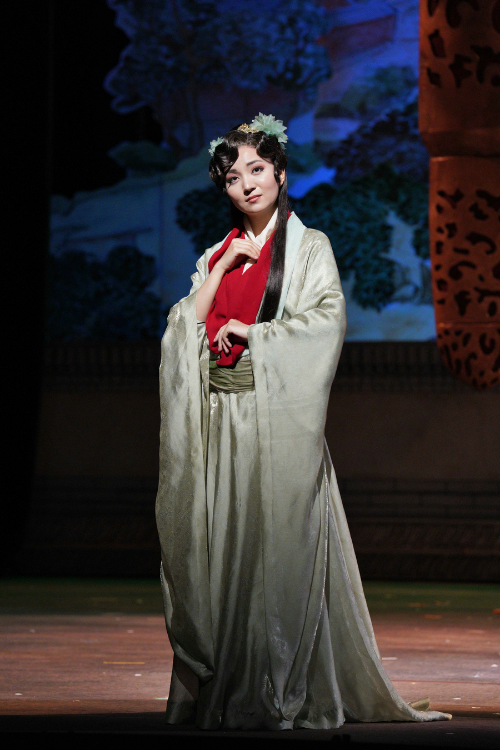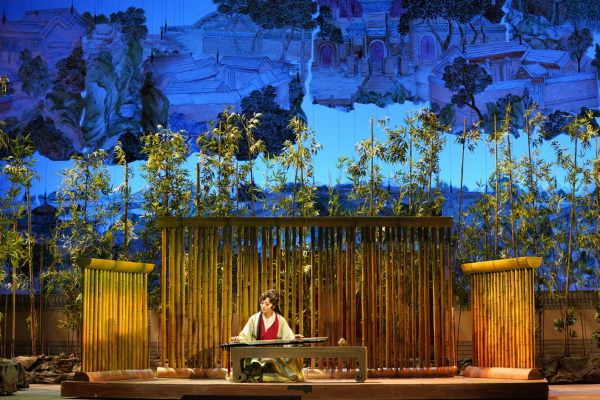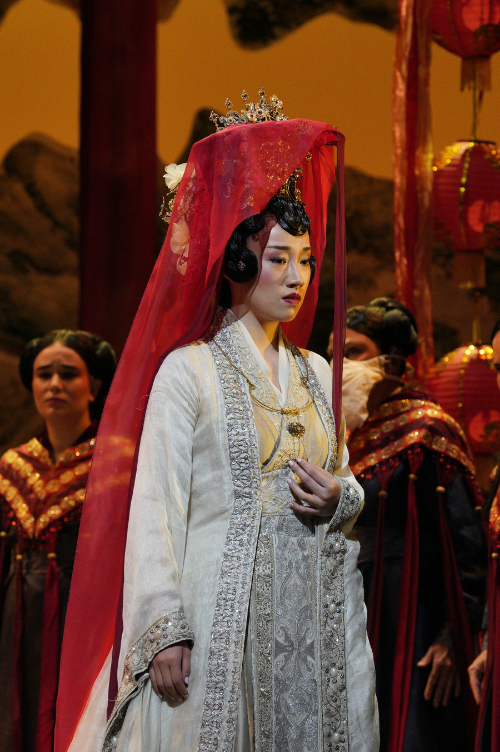Bringing the dream to life once more

Six years after the world debut of Dream of the Red Chamber, the first operatic adaptation of the epic 18th century Chinese novel of the same name, the opera will return to San Francisco with a mostly new cast and a more dramatic presentation.
The opera, developed for Western audiences, has garnered international acclaim since its premiere at San Francisco Opera in 2016.The opera was presented at the Hong Kong Arts Festival and toured three cities in China in 2017. It will return to the War Memorial Opera House in San Francisco with seven performances from Tuesday to July 3.

"I was excited and felt honored when I learned I was going to play Daiyu in the opera. It's such a famous novel in China and Daiyu is a beloved literary character," soprano Zhang Meigui says. "I hope to show the audience a fresh version of Daiyu, especially for those who saw it in 2016."
The 18th century novel centers on a love triangle that involves hero Bao Yu, his beautiful cousin Daiyu, and his future wife Baochai. It is a Chinese classic and still widely read in the Chinese-speaking world.
A big fan of the story, Zhang says she is familiar with the character but after she read the novel again, she had new thoughts.
"In the story, Daiyu is not only beautiful but also intelligent, sentimental and frail. She is also strong inside and would like to make sacrifices for love and freedom," she says. "I want the audience to see through the beautiful and fragile appearance to the inner characteristics-soft yet strong."
Born into a musical family in Chengdu, Sichuan province, the 28-year-old opera singer graduated from Shanghai Conservatory of Music in 2016 and moved to New York City, where she attended Mannes School of Music and earned her master's degree in 2018.
Zhang made her debut as Anne Trulove in The Rake's Progress with the San Francisco Opera's Merola Opera Program in the summer of 2018. She made her debut at the Metropolitan Opera during the 2019-20 season, singing in the roles of "bloody child" in Macbeth and Barbarina in Figaro.
Zhang has been preparing for the opera for half a year. "I watched the video (of the 2016 production). I think the performance of the singer (playing Daiyu) was excellent, because the melody was composed in an unusual way, which is very challenging and requires a lot of technique," she says.

In one of the most emotionally charged scenes - the Burial of the Flower Petals - Daiyu finds her world growing more bleak as her health continues to decline. She sings an aria: "When spring had fled and beauty is spent, who cares for the fallen petals?"
"The singer needs to sustain the high notes with a pianissimo (soft) sound, which requires more breath support and air control," says Zhang.
"Some parts of the music are more powerful with fortissimo (loud) and requires extremely expressive sound."
Bright Sheng, composer of the opera, explained in a 2016 interview with China Daily why Daiyu sings in a loud voice. "Music carries emotions that words cannot explain or say. To me, it has to be loud crying, beating one's bosom as she looks to the heavens to ask these questions."

For mezzo-soprano Wu Hongni, who plays the role of Baochai, the challenge comes from the language. A native of Jiangxi province, Wu graduated from Xinghai Conservatory of Music in 2011 and received her master's degree from the Manhattan School of Music in 2017.Since then, she has spent most of her time in Europe. In recent seasons, Wu made her debut at the Royal Opera House in London as Flora in La Traviata. She has since returned to the stage as Mercedes in Carmen. "I've performed in Italian, German and Russian, but never in English for an entire opera," she says.
Different from the 2016 version of Baochai, Wu says she will delve further into the character and show a more independent Baochai.
The renowned playwright and director, Stan Lai, returns to direct the 2022 production. Wu says the director wants Baochai to be endowed with the characteristics of a modern independent woman. "I like this idea," she says.
For the new production, Sheng says he made some revisions.
"A great opera is not only grand musical theater in action, but also a perfect marriage of music and drama. It is always a high priority for the creators and production team to make the storytelling more effortless, more directional," says Sheng.
"As a result, the opera is more dramatic and affectionate."
The opera also uses gongs and qin (stringed instrument) to create an introspective feeling. It's "meaningful" to bring back the Dream of Red Chamber now at a time when people of Asian descent are facing racism in the United States, says Zhang. She is also a victim of racism, once having had racial slurs shouted at her.
"There's no boundary in the world of music. It can connect people with different backgrounds. I hope American audiences will be touched by this opera and experience the glamour of Chinese culture," says Zhang. "People around me are all interested in Chinese culture."
Features
 Cultural Heritage
Improved water management brings old spring back to life
Cultural Heritage
Improved water management brings old spring back to life
 Cultural Exchanges
Two ancient instruments share deep cultural connection
Cultural Exchanges
Two ancient instruments share deep cultural connection


